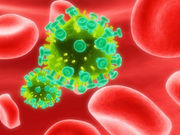Reduced risk of death at six months, faster clinical resolution and fungal clearance versus itraconazole
WEDNESDAY, June 14, 2017 (HealthDay News) — For patients with HIV with talaromycosis, amphotericin B deoxycholate (amphotericin) is superior to itraconazole, according to a study published in the June 15 issue of the New England Journal of Medicine.
Thuy Le, M.D., D.Phil., from Oxford University in the United Kingdom, and colleagues conducted an open-label, noninferiority trial involving 440 HIV-infected adults with talaromycosis. Participants were randomized to receive either intravenous amphotericin (219 patients) or itraconazole capsules (221 patients) for 14 days; thereafter all patients received itraconazole maintenance therapy.
The researchers found that the risk of death at week two was 6.5 and 7.4 percent in the amphotericin and itraconazole groups, respectively (absolute risk difference, 0.9 percentage points; 95 percent confidence interval, −3.9 to 5.6; P < 0.001 for noninferiority). At 24 weeks, the risk of death was 11.3 and 21.0 percent in the amphotericin and itraconazole groups, respectively (absolute risk difference, 9.7 percentage points; 95 percent confidence interval, 2.8 to 16.6; P = 0.006). Compared with itraconazole, amphotericin treatment correlated with significantly faster clinical resolution and fungal clearance and with significantly lower rates of relapse and immune reconstitution inflammatory syndrome. Compared with itraconazole, amphotericin was also associated with significantly higher rates of infusion-related reactions, renal failure, hypokalemia, hypomagnesemia, and anemia.
“Amphotericin was superior to itraconazole as initial treatment for talaromycosis with respect to six-month mortality, clinical response, and fungicidal activity,” the authors write.
Copyright © 2017 HealthDay. All rights reserved.








